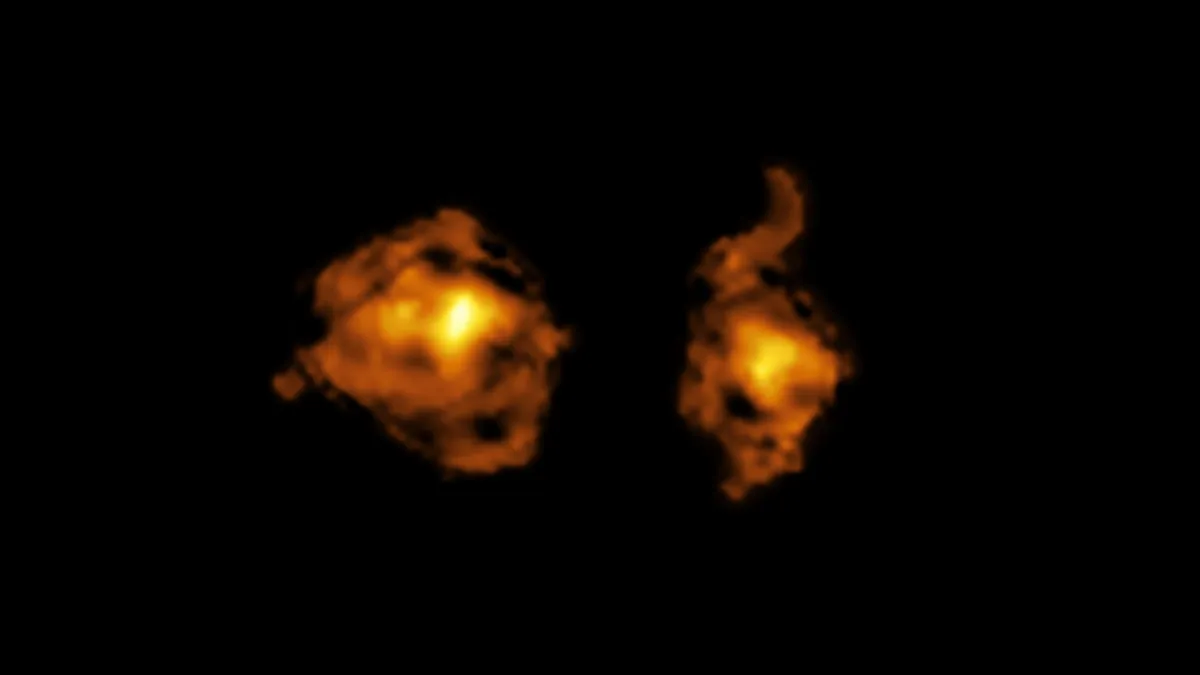
If you find yourself awake before sunrise this month, make sure to look towards the east. There, you will spot the bright planet Venus rising against the backdrop of the early morning sky. Just below this celestial beacon, in the constellation Cetus (also known as The Whale), a spectacular and violent event is unfolding: a cosmic joust between two giant galaxies. Located an astonishing 11 billion light-years from Earth, these galaxies are among the earliest formations in the universe, engaging in a high-speed collision at a staggering velocity of 310 miles per second (or 500 kilometers per second).
This extraordinary cosmic event has been captured by the European Southern Observatory's Very Large Telescope and the Atacama Large Millimeter/submillimeter Array in Chile. The findings were published this week in the journal Nature, showcasing an image that is truly unique. One of the galaxies involved in this collision is a quasar, which is characterized by a supermassive black hole at its center that consumes vast amounts of gas and dust. This process generates an incredibly bright glowing disk, making quasars some of the most luminous objects in the known universe. In fact, they can emit thousands of times more light than the entire Milky Way galaxy.
The quasar in question, designated as J012555.11−012925.00, is prominently featured on the right side of the image. As this galaxy collides with its counterpart on the left, it unleashes intense radiation that pierces through clouds of gas and dust, drawing a striking analogy to the medieval sport of jousting. This radiation inhibits the left galaxy's ability to form new stars, leading to a significant depletion of its star-forming potential. This is a groundbreaking moment for astronomers, as it marks the first time they have witnessed such a collision.
According to Sergey Balashev, co-lead of the study and a researcher at the Ioffe Institute in St. Petersburg, Russia, this observation allows scientists to see for the first time how a quasar's radiation impacts the internal structure of gas in an otherwise regular galaxy. The findings indicate that the radiation from the quasar only leaves the densest regions of gas and dust intact, which are likely too small to facilitate star formation.
As expected, the depletion of the companion galaxy enhances the power of the quasar, providing additional fuel to the supermassive black hole at its core. Balashev notes that such mergers are believed to channel vast amounts of gas into supermassive black holes residing in the centers of galaxies. This process not only enriches the quasar but also has profound implications for our understanding of galaxy evolution.
In addition to the breathtaking image, the European Southern Observatory has released a series of videos on YouTube. These videos delve into the science behind this galactic collision, offering a closer look at the event and presenting an artist's impression of the violence of the collision. This combination of visual and scientific exploration makes this astronomical event not only a stunning spectacle but also a rich source of knowledge for both astronomers and enthusiasts alike.